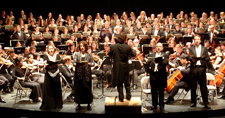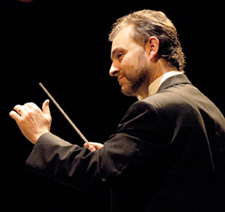Majestic? Degenerate? Carmina Burana continues to intrigue the world’s musicians
Brandeis unites with Wellesley College for a blockbuster concert as part of Leonard Bernstein Festival of the Creative Arts

Brandeis-Wellesley Orchestra

BWO conductor Neal Hampton
In 13th century Bavaria, a song-loving crew of university and monastery dropouts put together what might be considered the first boxed set: a collection of lyrics that celebrated religion, love, and a good amount of drinking and gambling. The lyrics were in Latin, which served two purposes: it was appropriate for the ecclesiastical themes, and it camouflaged the naughty bits. The manuscript rested quietly in the monastery at Beuren for the next six hundred years. In 1937, the young German composer Carl Orff set selections from the Latin text to music, and the resulting cantata, now known as Carmina Burana (literally, songs from Beuren), rocked Frankfurt and the rest of Germany.
Had the work originated in another country at another time, the earnest young composer—founder of a children’s music school, admirer of Stravinsky—might be regarded with less controversy. But musicologists and biographers cannot agree on the extent of Orff’s involvement in the Nazi Party. Some see him as a working artist who would not turn down a commission or a performance, even one associated with an ideology he may have opposed. Orff’s use of the songs’ original Latin text is seen as evidence that he considered himself pro-European rather than a German nationalist, and indeed, the Nazi Party newspaper denounced the work as degenerate. (Three years later, however, nationalist critic Alfred Rosenberg declared it “the clear, ardent, and disciplined music required for our times.”) Others interpret Orff’s own vague statements and missing pieces of personal history as proof of party sympathies, and they read a fascist aesthetic into the music itself. Regardless, Carmina Burana has been performed around the world since 1937, recently by an Israeli dance company at the Beijing Olympics.
Singers love the challenge of the rapid, percussive Latin text. Audiences respond to the sensual call of the melody and rhythm. And if it reminds you of Black Sabbath, it’s because Ozzie Osbourne has used the music for years as his stage entrance theme.
On Saturday, April 25 at 8:30 p.m. in Levin Ballroom, Carmina Burana will be performed by the Brandeis-Wellesley Orchestra, the Brandeis University Chorus, the Wellesley College Chorus, and guest soloists and choruses in a free concert during the Leonard Bernstein Festival of the Creative Arts. Discover why classical conductors, hip-hop artists, heavy-metal musicians, and the New England Patriots can’t get enough of Carmina Burana.
Neal Hampton, BWO conductor; Lisa Graham, director of the Wellesley College choral program; Sarah Mead, guest choral director. Soloists are David Ripley (baritone) has performed internationally with Boston Music Theater; Wellesley’s Andrea Matthews (soprano) has been lauded for her “quicksilver voice...honest to the bones;” and Mark Kagan (tenor) from the Department of Music.
Click here for the complete Leonard Bernsten Festival of the Creative Arts schedule.
-- Ingrid Schorr with Rebecca Ney ‘11





